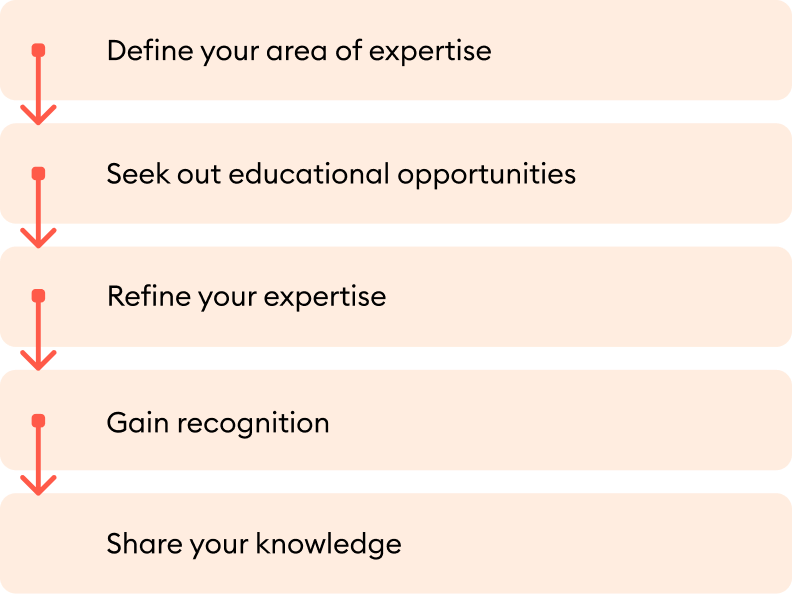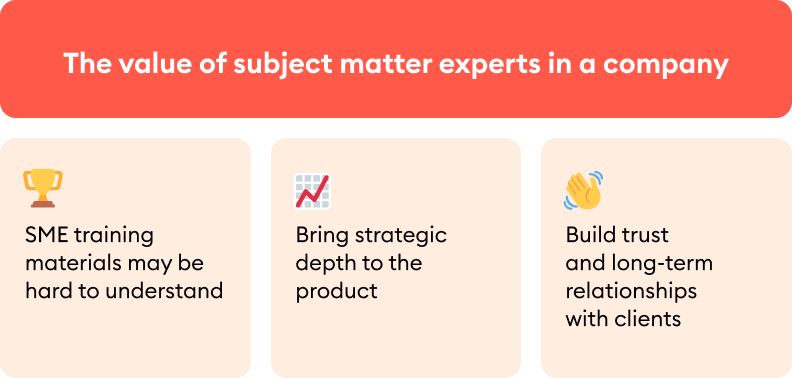Who are Subject Matter Experts?

Subject Matter Experts (SMEs) are the driving force behind every breakthrough product. They translate abstract ideas into practical solutions, see opportunities where others see obstacles, and distill complexity into clear, actionable steps.
Here’s what you need to know about subject matter experts. You’ll learn how they work, how they make an impact, and how to set yourself on the path to becoming one.
What is a Subject Matter Expert?
A Subject Matter Expert (SME) is a domain expert with extensive skills and knowledge of a particular subject. Such knowledge is developed over years of hands-on experience. SMEs actively contribute to projects and businesses as key sources of expertise to:
- Solve complex problems by finding root causes and implementing efficient solutions.
- Develop new approaches through fresh perspectives.
- Provide expert advice to guide decision-makers.
- Bridge the gap between complex expertise and business challenges in specific areas.
An SME’s role is dynamic and flexible, depending on organizational needs — any employee with relevant skills and professional experience can act as a subject matter expert.
When in-house expertise is unavailable, engaging an external SME ensures that critical projects are supported by the necessary proficiency, helping businesses achieve their goals efficiently.
How Subject Matter Experts Operate in Teams
Subject matter experts actively engage with various departments to solve complex challenges:
- C-Level executives: SMEs adapt complex data into strategies to help them make informed decisions and perceive long-term opportunities.
- Analysts: they translate abstract findings into real-world applications to bridge the gap between data and execution.
- Fieldworkers: subject matter experts create guides or training modules for knowledge transfer.
- Product teams: they transform client feedback into detailed technical requirements that meet business needs.
SMEs can rely on task boards, project management tools, and knowledge bases to keep work organized. Combine that with learning management systems and cross-departmental meetings, and you have a powerful framework for resolving conflicts, defining roles, and fostering effective communication within the company.
SME roles and responsibilities
Subject matter experts take on responsibilities tailored to the specific goals of their involvement. The following outlines the tasks that subject matter experts typically perform:

At its core, the job of a subject matter expert is to apply their specialized knowledge to a specific task, ensuring that it aligns with the business objectives.
Steps to Become a Subject Matter Expert
Being a subject matter expert means not only having a deep understanding of an area but also having a reputation as a trusted resource in a specific domain. Below are general steps to guide you on the path to becoming an SME.

1. Define your area of expertise
Start by identifying a specific topic that aligns with your professional goals and interests. Research which areas are in high demand in your field to ensure that your focus has value in the industry. If you’re skilled in multiple areas, prioritize the one you’re most passionate about or have the greatest growth potential. Narrowing your focus lays the foundation for building further expertise.
2. Seek out educational opportunities
Continuous learning is essential for ongoing skill development. Here are some ways to expand your expertise:
- Take courses and certifications relevant to your domain, like the Certified Professional in Learning and Performance (CPLP) for eLearning experts.
- Attend conferences, seminars, and workshops to stay updated on the latest trends and technologies in your field.
- Engage with professional communities like LinkedIn groups to participate in discussions and exchange ideas.
- Leverage online events, webinars, hackathons, or training sessions to take part in real-world projects.
- Invest in formal education or other structured educational opportunities to strengthen your credentials and foundational knowledge.
3. Refine your expertise
Actively apply your knowledge and assess its impact. Here’s how:
- Test solutions in controlled environments to minimize risks.
- Gather feedback and analyze the results to spot areas for improvement.
- Simulate real-world challenges through A/B testing or case study exercises, then compare your outcomes with industry benchmarks.
- Use project management tools like Jira and conduct retrospectives to pinpoint what worked and what didn’t.
This iterative process of testing, analyzing, and refining ensures that your expertise remains relevant and effective.
4. Gain recognition
Focus on building visibility and credibility through networking. Participating as a speaker at industry conferences, hosting your own sessions and workshops, working with other experts on projects, and actively participating in your professional community will establish you as a go-to authority in your field.
5. Share your knowledge
Transform your knowledge into valuable content and distribute it across platforms to reach your audience:
- Share articles, case studies, or thought leadership pieces on professional communities, blogs, or LinkedIn.
- Create valuable courses to help others learn from your experience. Using authoring tools like iSpring Suite, you can design and share professional eLearning content without the need for advanced technical skills, thanks to an intuitive interface and a variety of ready-made templates for quick starts. Once your content is ready, it can be published and shared instantly via the cloud, ensuring that your audience has access to your experience in the most convenient formats.
- Host webinars and conduct virtual or in-person sessions to demonstrate your problem-solving skills and provide insights into your niche.
Integrating SMEs into the Sales Process
Incorporating subject matter experts into the sales process can help an organization not only gain customer trust but also accelerate decision-making and deal closing. An SME can provide value in several ways:
- Conduct software demos, answering complex questions, and showing how the product solves specific problems, thereby building customer confidence in the SME’s capabilities.
- In strategic discussions, an SME with C-level engagement experience can articulate the product’s business value and align it with the customer’s strategic goals, helping to secure buy-in from decision-makers.
- Bring deep domain knowledge that helps identify customer challenges and offer tailored solutions that resonate with their unique needs.
- Simplify communication by explaining complex abstracts so non-expert customers can fully grasp the product’s value proposition.
Remember that preparation is key. The expert must provide guidance by:
- Understanding the client’s business by learning the specifics of their industry, goals, and potential pain points.
- Knowing the relationship that is in place, who the decision-makers are, and what issues may be a priority.
- Preparing documentation, agreeing on demos, technical examples, and key talking points.
Keep in mind that subject matter experts do not replace the sales team; they complement the process. For successful integration, it’s essential to understand the SME job’s meaning and ensure that their expertise aligns with the sales team’s strategy. Even the most qualified expert won’t be able to close a deal if others have not been sufficiently trained in presenting the product or handling customer objections.
Explore our guide with actionable insights if you want to get the most out of your relationships with SMEs.
Managing SME knowledge for better results
Regularly asking SMEs for the same information, like technical details, common customer questions, or product clarification, can slow down the sales process and distract from strategic tasks. Effective management involves structuring SME knowledge into accessible resources. A Learning Management System (LMS) can play a key role in this process. An LMS is a system designed to organize, deliver, and track training and knowledge-sharing across an organization. With an LMS, you can:
- Create a centralized knowledge base and store SME insights, technical details, and best practices in one place.
- Reduce repetitive requests to SMEs by making answers to common questions readily available to the sales team.
- Provide structured resources for new hires, accelerating their training and ensuring consistency in knowledge transfer.
- Enable SMEs to update their materials easily, ensuring that teams always work with the most accurate and relevant information.
If you’re looking for a solution with a dedicated knowledge base, iSpring LMS offers a powerful feature set designed to maximize the value of SME expertise. Its Knowledge Base allows you to:
- Easily organize SME content into an intuitive, searchable library that everyone can access anytime.
- Provide SMEs with user-friendly tools to update materials effortlessly.
- Track resource usage to identify which materials are most effective and ensure that SMEs understand their impact.
Practical Examples of SME Scenarios
The deep expertise of SMEs enables organizations to solve complex problems, optimize processes, and achieve strategic goals. Let’s explore how subject matter experts can make a difference across various industries.
IT SMEs: optimizing solutions with scalable strategies
Technical SMEs can use their experience of working with cloud providers and their skills with optimization tools to help cloud architects design scalable hybrid solutions. Because subject matter experts are valuable for their unique expertise in a narrow area, they may already have experience with a similar case, and their solution will be ideal for you.
eLearning SMEs: designing engaging learning
In eLearning, subject matter experts help create impactful learning materials. Instructional designers develop interactive content that aligns with learning objectives. Their understanding allows them to design courses that improve retention and engagement.
Manufacturing SMEs: driving sustainability and innovation
Subject matter experts in manufacturing focus on optimizing processes, sustainability, and innovation. Experts in lean manufacturing help companies reduce waste and increase productivity. Environmental SMEs are key to greening industries through recycling, renewable energy, and more.
Challenges and Limitations of SMEs
Although subject matter experts have considerable expertise, they also have limitations. With structured onboarding and guidance, you can avoid those limits and get the most out of hiring an expert.

Problem:
SMEs, especially external ones, may not have a sufficient understanding of the company’s internal workflows and culture.
Solution:
- Provide experts with as much data as possible before they begin, including current processes, strategic goals, and constraints.
- Involve staff in the process of adapting to the subject matter expert and their proposals.
- Test the SME’s proposed approaches in limited areas before full integration.

Problem:
SMEs’ narrow specialization sometimes hinders their ability to see the big picture.
Solution:
- Integrate the SME’s highly specialized knowledge into the overall context through joint discussions with representatives from different departments.
- Assign a project manager to coordinate the SME’s work with other specialists.
- Provide valuable feedback to the subject matter expert to help them tailor their recommendations to the needs of the business.

Problem:
Staff may resist training if the materials produced by the SMEs are seen as complex or detached from reality.
Solution:
- Involve workers in the course design process and address their needs and expectations.
- Break the course into small modules, so these can be easily adapted and implemented.
- Subject matter experts can use interactive elements such as simulations, cases, and quizzes to make the learning experience more engaging.
Remember: even the greatest subject matter experts aren’t magicians. They require attention and onboarding. Set clear goals and expectations, automate processes, and integrate SMEs into your business strategy, and you’ll have a win-win situation.
How SMEs Build Credibility in Organizations
SMEs empower not only the entire organization but also the individual teams within it. You may be an expert in your product or service, but in complex, specialized fields, a fresh perspective can be a game changer.
- SMEs have a unique level of expertise in specific industries, from the technical aspects to the regulatory requirements. Their experience can be shared as they work.
- SMEs don’t use a one-size-fits-all approach when dealing with complex business situations. Instead, they analyze specific problems and offer unique solutions to achieve their objectives.
- SMEs add a fresh and unique layer to your training programs. They help learners adapt faster and increase productivity by translating complex topics into accessible formats.
- Many SMEs are active in developing their brands by participating in professional communities, publishing articles, and speaking at conferences. By featuring the materials from your projects, they will enhance your company’s reputation as an authority in the industry.
Why SME Roles Are Critical for Business Success
When you engage subject matter experts in sales, marketing, or other areas that interact directly with audiences, they can give customers the answers they want — accurate, clear, and based on real data.

Customers come for solutions, not advertising. When potential customers hear an answer from a subject matter expert, they feel more confident because it’s advice, not sales.
Even the best copywriters or designers can’t convey the technical and strategic depth that SMEs bring. They don’t just fill in the content gaps — they add the heart and soul that makes the offer compelling and winning.
SME credibility is the foundation of a successful sale. When a customer wants to hear from an SME, it speaks to their commitment and desire to actually solve a problem with your help. It’s important to “tell, not sell” at this stage. SMEs provide answers without sales or marketing filters, and that’s what helps build trust.
Conclusion
The SME position is pivotal for addressing specific challenges within an organization. SMEs, such as technical subject matter experts, offer clarity and depth that no generalist can match. Whether you’re looking to work with an SME or become one yourself, understanding their role and impact is a key step toward achieving success in today’s business.







